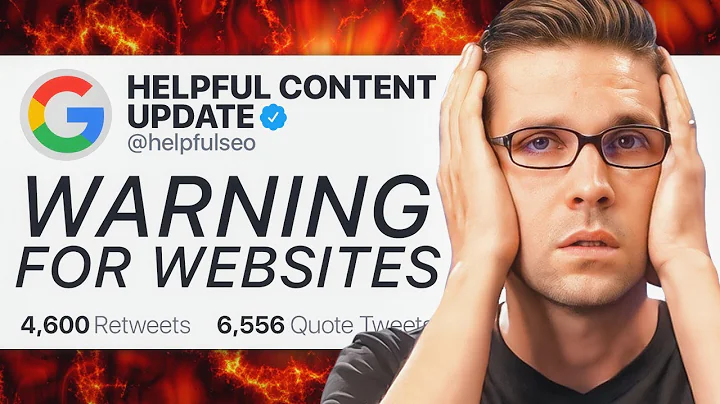Master Technical SEO in 2024: The Ultimate Beginner's Guide
Beginner's Guide to Technical SEO
Table of Contents:
- Introduction to Technical SEO
- Website and URL Structure
- Meta Titles and Descriptions
- Headings
- Mobile Responsiveness
- Image Size and Alt Text
- XML Sitemap
- SSL Certificate
- Redirects
- Schema and Canonical Tags
- Google's Core Web Vitals
Introduction to Technical SEO
In this beginner's guide to technical SEO, we will cover everything you need to know about optimizing your website for search engine rankings. Technical SEO is an essential part of on-page SEO that focuses on factors other than content. Neglecting technical SEO can prevent your website from ranking well, regardless of the quality of your content or backlinks. In this guide, we will explore the practical steps you should take to implement technical SEO effectively.
Website and URL Structure
The structure of your website and URLs plays a crucial role in technical SEO. It is essential to have a clear website structure that search engines can crawl easily. Additionally, your URLs should be concise and follow a logical structure. Including relevant keywords in your URLs can also benefit your rankings.
Meta Titles and Descriptions
Meta titles and descriptions are HTML tags that provide a brief summary of your web page's content to search engines and users. Writing unique and compelling meta titles and descriptions is essential for both search engine rankings and user click-through rates. Including your target keywords in the meta titles can improve your website's visibility in search results.
Headings
Headings, such as H1, H2, and H3 tags, are used to structure the content on your web page. Effective use of headings helps search engines understand the hierarchy and organization of your content. It is crucial to have only one H1 heading per page and include your primary keyword in this heading. Utilize variations of your keywords in H2 and H3 headings to enhance the relevance and structure of your content.
Mobile Responsiveness
With the increasing number of mobile users, having a mobile-responsive website is vital for SEO success. Your website should load quickly and display correctly on all mobile devices. Ensure that the text is readable and the buttons are easy to navigate on mobile screens. Google prioritizes mobile-friendly websites and may penalize those that have a poor mobile experience.
Image Size and Alt Text
Optimizing image size and alt text is crucial for both SEO and user experience. Large image files can slow down your website's loading speed, negatively impacting your rankings. Compressing images and reducing their file sizes without compromising quality is recommended. Additionally, providing relevant alt text for each image helps search engines understand the image's context and improves accessibility for visually impaired users.
XML Sitemap
An XML sitemap is a file that lists all the pages on your website and their hierarchical structure. It helps search engines discover and index your web pages more effectively. SEO plugins like Yoast can generate XML sitemaps automatically, but you can also create one manually and submit it to Google Search Console for better crawling and indexing.
SSL Certificate
Having an SSL certificate installed on your website is crucial for security and SEO. SSL certificates encrypt the data transfer between your website and users, ensuring a secure browsing experience. Google considers SSL certificates as a ranking factor and may penalize websites that do not have a secure connection. Contact your hosting provider to obtain and enable an SSL certificate for your website.
Redirects
Redirects are essential for ensuring a smooth user experience and preserving SEO value when you change or remove pages on your website. Properly redirecting old URLs to relevant new URLs prevents users from encountering broken or dead-end pages. Use redirects to guide users and search engine bots to the most appropriate page when they access outdated or removed pages.
Schema and Canonical Tags
Schema markup is structured data that helps search engines understand the content on your web pages better. Although many SEO plugins handle this automatically, you can generate and implement schema manually to provide more context to search engines. Canonical tags are used to indicate the preferred version of duplicated or similar content. By specifying the canonical URL, you can avoid duplicate content issues and consolidate ranking signals to the preferred page.
Google's Core Web Vitals
Google's Core Web Vitals are a set of metrics that measure website loading performance, interactivity, and visual stability. These metrics, such as First Contentful Paint (FCP) and Largest Contentful Paint (LCP), reflect user experience and can impact your SEO rankings. Analyzing and optimizing your website according to Google's Core Web Vitals recommendations can lead to improved rankings and better overall performance.
🌟 Highlights:
- Technical SEO is crucial for website rankings.
- Website and URL structure should be clear and concise.
- Meta titles and descriptions impact search engine visibility and click-through rates.
- Proper use of headings improves content structure and organization.
- Mobile responsiveness is vital due to increasing mobile usage.
- Optimized image size and alt text enhance user experience and accessibility.
- XML sitemaps facilitate better crawling and indexing.
- SSL certificates ensure a secure browsing experience and improve rankings.
- Redirects maintain SEO value when changing or removing pages.
- Schema and canonical tags provide additional context to search engines.
- Optimizing for Google's Core Web Vitals improves user experience and SEO rankings.
FAQ:
Q: How can I optimize my website's loading speed?
A: You can optimize your website's loading speed by compressing images, minimizing CSS and JavaScript files, utilizing browser caching, and choosing a fast hosting provider.
Q: What is the purpose of alt text in SEO?
A: Alt text provides a textual description of an image for search engines and visually impaired users. It helps search engines understand the image's context and improve your website's accessibility.
Q: Are SSL certificates necessary for all websites?
A: Yes, SSL certificates are essential for all websites, regardless of their nature. They provide a secure connection, enhance user trust, and improve SEO rankings.
Q: Do I need to manually generate a sitemap for my website?
A: SEO plugins like Yoast or All-in-One SEO can automatically generate XML sitemaps for your website. However, if your plugin doesn't handle it, you can use online tools or plugins to create and submit a sitemap to Google Search Console.
Q: How can I ensure my website is mobile-responsive?
A: To ensure mobile responsiveness, use a responsive web design, optimize images for mobile devices, prioritize mobile loading speed, and test your website's compatibility across various mobile devices.
Q: Is it necessary to optimize for Google's Core Web Vitals?
A: Optimizing for Google's Core Web Vitals is crucial for providing a better user experience and improving SEO rankings. By optimizing loading performance, interactivity, and visual stability, you can enhance your website's competitiveness in search results.
Resources:







